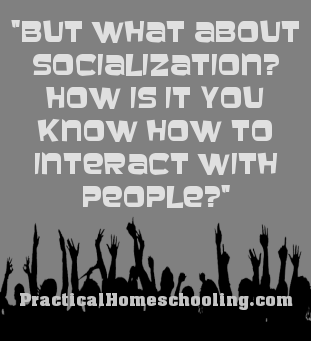 "You were homeschooled?"
"You were homeschooled?"
The incredulity of my friend's voice surprised me a little.
More and more often I go through this sort of conversation with people at my college.
The next thing said is something to the effect of, "But you're so normal!"
The follow-up question is the one that always gets me, though: "But what about socialization? How is
it you know how to interact with people?"
The simplest answer to that is that since I was old enough to remember, I've always been around
people of different ages and types. I learned to interact with adults at a very young age, and by
merit of helping diaper, feed, and rock my younger siblings to sleep when they were babies, I know
how to handle children as well. Growing up as a homeschooler didn't handicap me socially. It
expanded my horizons past the normal "age barrier" between generations, and gave me a taste of the
real world: a world in which every person is not like me.
However, it is also true that homeschooling is a culture of its own. As someone raised slightly
outside the mainstream, more than once I have found it easy to relate to my homeschooled peers,
international students, minority students, and other such diverse groups. I've actually noticed it
was easier for me to reach out than it was for those students who were traditionally schooled
through public schools.
Being a homeschooler is much like being an international student. Both groups have strong family
ties, strong opinions, and a passion for learning.
However, language barriers often handicap the international students and they are often required to
take English classes to improve communication skills.
Because of these problems and the differences between international students and American students,
many American students don't take the time to talk with exchange or international students. They
miss out on so much. No geography lesson is equal to being able to sit and talk with an
international student about their country and their culture and even to learn what they think of
America and its government and people. It's like being transported to that country for a short space
in time. This is one of the great benefits of college!
I've loved making friends from Kenya, China, Korea, Latin America, and other places. Homeschooling
has taught me to appreciate their perspectives and their friendship.
Part of coming from a richly diverse culture is being willing to learn about and understand other
cultures. By not being trapped behind a desk for six hours of the day with only five minutes to run
from class to class, but rather being out in the real world meeting new people of all types,
homeschoolers have a definite advantage. We grow up meeting each person as an individual, not as a
member of a school clique. This makes it easier to interact with other people, not harder.
Even growing up in the suburban Midwest, I was exposed to people of all different colors and ages
through my extracurricular activities. And by not being shuttled to a public or private school every
day and spending time with the same people I had seen since kindergarten, I was not trapped into a
social rut like many of the students at my college.
Going straight from high school, where everyone knows everyone else, and has a tight group of
friends, to college is quite a step for these students. They still think life is like high school,
and they expect people to dress the same way and act the same way their friends acted in high
school.
They don't normally spend time with people outside of their own age range, so sometimes the
diversity of ages of classmates in college can make them uncomfortable.
Beyond this discomfort, many of these students will not take the time to learn from their older
classmates, expecting that since they are in the same class, they all possess the same knowledge. By
not being open to those who have already learned some of life's lessons, they are limiting
themselves.
However, it all comes back to that universal question for homeschoolers. What about
socialization?
Homeschoolers don't live in a vacuum. There isn't one homeschooler I know who hasn't been involved
in outside extracurricular activities. Through these activities, they have spent time with all
different ages and types of people. They have friends in all age groups, and they learn from those
people as much as they share with them.
Homeschoolers aren't being crippled socially. We are the ones who are ready to go out and live in
the real world.